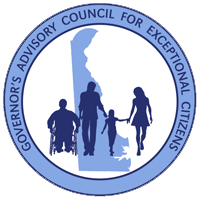Stepping into the world of employment is an exciting time of life, where we grow and develop new skills, earn income and gain independence. Individuals with disabilities will find the transition process easier because of the information compiled by many state and federal agencies and organizations.
This section will continue to grow as collaboration unites individuals, families and teachers who assist individuals with disabilities. A successful transition process will provide multiple work experiences in the community through volunteering, internships or working for a business or nonprofit organization.
FREQUENTLY ASKED QUESTIONS
I want to work, how can I get ready for a job?
Services are available to help students transition from school to work. You can explore your skills and capabilities just like other young people would.
Will I lose my Medicaid if I get a job?
No, you will not loose your Medicaid benefits if you work.
Will I lose my Social Security benefits if I get a job?
Supplemental Security recipients income is adjusted.
I am a person with a disability. Where can I get information and financial assistance to start my own business?
The Job Accommodation Network (JAN), a free service funded by DOL's Office of Disability Employment Policy (ODEP), offers assistance to individuals with disabilities interested in self-employment and entrepreneurship. Live phone service is also available 9 a.m. to 6 p.m. ET by calling (toll-free) 1-800-526-7234 (Voice) or 1-877-781-9403 (TTY).
I'm a person with a disability and I would like to work for the federal government. How do I get a job with the government?
As the nation's largest employer, the federal government has committed to modeling effective employment policies and practices that advance America's ideal of equal opportunity for all people, including people with disabilities. A good place to learn more about related initiatives is the Federal Government page of DOL's Office of Disability Employment Policy's (OPEP) website. Specific information about how to learn about and apply for federal employment is available on the Office of Personnel Management's (OPM) web page for job seekers with disabilities.
Is there anything that my employer must provide to help me do my job and accommodate my disability?
The Americans with Disabilities Act (ADA) and other disability-related nondiscrimination laws have specific requirements regarding reasonable workplace accommodations for people with disabilities. The Job Accommodation Network (JAN), a free service funded by ODEP, is the leading source of information on workplace accommodations and can assist both individuals and employers in understanding their related rights and responsibilities. Live phone service is also available 9 a.m. to 6 p.m. ET by calling (toll-free) 1-800-526-7234 (Voice) or 1-877-781-9403 (TTY).
What can I do if I think my employer or supervisor is discriminating against me because of my disability?
If you feel you have been or are being discriminated against on the basis of a disability, you may file a complaint under the Americans with Disabilities Act (ADA). The ADA is administered and enforced by the Equal Employment Opportunity Commission (EEOC). To explore further, read the EEOC's fact sheet titled The ADA: Your Employment Rights as an Individual With a Disability, which includes information about how to file a complaint. There may also be applicable disability nondiscrimination laws in your state. For more information, contact your Delaware Department of Labor.
I have recently become disabled and cannot do the work I had been doing in the past. Where can I get financial assistance for training or retraining?
Financial assistance for persons with disabilities preparing to enter or re-enter the workforce may be available through your closest One-Stop Career Center. These "One-Stops," located in communities across the U.S., provide direct employment and training services to job seekers, including those with disabilities. To find your nearest One-Stop, visit America's Service Locator or call (toll-free) 1-877-US2-JOBS (1-877-872-5627) (Voice) or TTY.
What is a Disability-Related Question?
Disability-Related Question is a question that is likely to elicit information about a disability. At the pre-offer stage, an employer cannot ask questions that are likely to elicit information about a disability. This includes directly asking whether an applicant has a particular disability. It also means that an employer cannot ask questions that are closely related to a disability.
On the other hand, if there are many possible answers to a question and only some of those answers would contain disability-related information, that question is not "disability-related.
May an employer ask whether an applicant can perform the job?
Yes. An employer may ask whether applicants can perform any or all job functions, including whether applicants can perform job functions "with or without reasonable accommodation.
May an employer ask applicants to describe or demonstrate how they would perform the job (including any needed reasonable accommodations)?
Yes. An employer may ask applicants to describe how they would perform any or all job functions, as long as all applicants in the job category are asked to do this.
Employers should remember that, if an applicant says that s/he will need a reasonable accommodation to do a job demonstration, the employer must either provide a reasonable accommodation that does not create an undue hardship; or allow the applicant to simply describe how s/he would perform the job function.
May an employer ask a particular applicant to describe or demonstrate how s/he would perform the job, if other applicants aren't asked to do this?
When an employer could reasonably believe that an applicant will not be able to perform a job function because of a known disability, the employer may ask that particular applicant to describe or demonstrate how s/he would perform the function. An applicant's disability would be a "known disability" either because it is obvious (for example, the applicant uses a wheelchair), or because the applicant has voluntarily disclosed that s/he has a hidden disability.
May an employer ask applicants whether they will need reasonable accommodation for the hiring process?
Yes. An employer may tell applicants what the hiring process involves (for example, an interview, timed written test, or job demonstration), and may ask applicants whether they will need a reasonable accommodation for this process.
May an employer ask an applicant for documentation of his/her disability when the applicant requests reasonable accommodation for the hiring process?
Yes. If the need for accommodation is not obvious, an employer may ask an applicant for reasonable documentation about his/her disability if the applicant requests reasonable accommodation for the hiring process (such as a request for the employer to reformat an examination, or a request for an accommodation in connection with a job demonstration). The employer is entitled to know that the applicant has a covered disability and that s/he needs an accommodation. So, the applicant may be required to provide documentation from an appropriate professional, such as a doctor or a rehabilitation counselor, concerning the applicant's disability and functional limitations.
May an employer ask applicants whether they will need reasonable accommodation to perform the functions of the job?
In general, an employer may not ask questions on an application or in an interview about whether an applicant will need reasonable accommodation for a job. This is because these questions are likely to elicit whether the applicant has a disability (generally, only people who have disabilities will need reasonable accommodations).
Example: An employment application may not ask, "Do you need reasonable accommodation to perform this job?"
Example: An employment application may not ask, "Can you do these functions with ___ without ___ reasonable accommodation?
Example: An applicant with no known disability is being interviewed for a job. He has not asked for any reasonable accommodation, either for the application process or for the job. The employer may not ask him, "Will you need reasonable accommodation to perform this job?"
However, when an employer could reasonably believe that an applicant will need reasonable accommodation to perform the functions of the job, the employer may ask that applicant certain limited questions. Specifically, the employer may ask whether s/he needs reasonable accommodation and what type of reasonable accommodation would be needed to perform the functions of the job.
The employer could ask these questions if:
- the employer reasonably believes the applicant will need reasonable accommodation because of an obvious disability;
- the employer reasonably believes the applicant will need reasonable accommodation because of a hidden disability that the applicant has voluntarily disclosed to the employer; or
- an applicant has voluntarily disclosed to the employer that s/he needs reasonable accommodation to perform the job.
Example: An individual with diabetes applying for a receptionist position voluntarily discloses that she will need periodic breaks to take medication. The employer may ask the applicant question about the reasonable accommodation such as how often she will need breaks, and how long the breaks must be. Of course, the employer may not ask any questions about the underlying physical condition.
Example: An applicant with a severe visual impairment applies for a job involving computer work. The employer may ask whether he will need reasonable accommodation to perform the functions of the job. If the applicant answers "no," the employer may not ask additional questions about reasonable accommodation (although, of course, the employer could ask the applicant to describe or demonstrate performance). If the applicant says that he will need accommodation, the employer may ask questions about the type of required accommodation such as, "What will you need?" If the applicant says he needs software that increases the size of text on the computer screen, the employer may ask questions such as, "Who makes that software?" "Do you need a particular brand?" or "Is that software compatible with our computers?" However, the employer may not ask questions about the applicant's underlying condition. In addition, the employer may not ask reasonable accommodation questions that are unrelated to job functions such as, "Will you need reasonable accommodation to get to the cafeteria?"
An employer may only ask about reasonable accommodation that is needed now or in the near future. An applicant is not required to disclose reasonable accommodations that may be needed in the more distant future.
May an employer ask whether an applicant can meet the employer's attendance requirements?
Yes. An employer may state its attendance requirements and ask whether an applicant can meet them. An employer also may ask about an applicant's prior attendance record (for example, how many days the applicant was absent from his/her last job). These questions are not likely to elicit information about a disability because there may be many reasons unrelated to disability why someone cannot meet attendance requirements or was frequently absent from a previous job (for example, an applicant may have had day-care problems).
An employer also may ask questions designed to detect whether an applicant abused his/her leave because these questions are not likely to elicit information about a disability.
Example: An employer may ask an applicant, "How many Mondays or Fridays were you absent last year on leave other than approved vacation leave?"
However, at the pre-offer stage, an employer may not ask how many days an applicant was sick, because these questions relate directly to the severity of an individual's impairments. Therefore, these questions are likely to elicit information about a disability.
May an employer ask applicants about their certifications and licenses?
Yes. An employer may ask an applicant at the pre-offer stage whether s/he has certifications or licenses required for any job duties. An employer also may ask an applicant whether s/he intends to get a particular job-related certification or license, or why s/he does not have the certification or license. These questions are not likely to elicit information about an applicant's disability because there may be a number of reasons unrelated to disability why someone does not have -- or does not intend to get -- a certification/license.
May an employer ask applicants about their arrest or conviction records?
Yes. Questions about an applicant's arrest or conviction records are not likely to elicit information about disability because there are many reasons unrelated to disability why someone may have an arrest/conviction record.
May an employer ask questions about an applicant's impairments?
Yes, if the particular question is not likely to elicit information about whether the applicant has a disability. It is important to remember that not all impairments will be disabilities; an impairment is a disability only if it substantially limits a major life activity. So, an employer may ask an applicant with a broken leg how she broke her leg. Since a broken leg normally is a temporary condition which does not rise to the level of a disability, this question is not likely to disclose whether the applicant has a disability. But, such questions as "Do you expect the leg to heal normally?" or "Do you break bones easily?" would be disability-related. Certainly, an employer may not ask a broad question about impairments that is likely to elicit information about disability, such as, "What impairments do you have?"
May an employer ask whether applicants can perform major life activities, such as standing, lifting, walking, etc.?
Questions about whether an applicant can perform major life activities are almost always disability-related because they are likely to elicit information about a disability. For example, if an applicant cannot stand or walk, it is likely to be a result of a disability. So, these questions are prohibited at the pre-offer stage unless they are specifically about the ability to perform job functions.
May an employer ask applicants about their workers' compensation History?
No. An employer may not ask applicants about job-related injuries or workers' compensation history. These questions relate directly to the severity of an applicant's impairments. Therefore, these questions are likely to elicit information about disability.
May an employer ask applicants about their current illegal use of drugs?
Yes. An employer may ask applicants about current illegal use of drugs because an individual who currently illegally uses drugs is not protected under the ADA (when the employer acts on the basis of the drug use).
May an employer ask applicants about their lawful drug use?
No, if the question is likely to elicit information about disability. Employers should know that many questions about current or prior lawful drug use are likely to elicit information about a disability, and are therefore impermissible at the pre-offer stage. For example, questions like, "What medications are you currently taking?" or "Have you ever taken AZT?" certainly elicit information about whether an applicant has a disability.
However, some innocuous questions about lawful drug use are not likely to elicit information about disability.
Example: During her interview, an applicant volunteers to the interviewer that she is coughing and wheezing because her allergies are acting up as a result of pollen in the air. The interviewer, who also has allergies, tells the applicant that he finds "Lemebreathe" (an over-the-counter antihistamine) to be effective, and asks the applicant if she has tried it. There are many reasons why someone might have tried "Lemebreathe" which have nothing to do with disability. Therefore, this question is not likely to elicit information about a disability.
May an employer ask applicants about their lawful drug use if the employer is administering a test for illegal use of drugs?
Yes, if an applicant tests positive for illegal drug use. In that case, the employer may validate the test results by asking about lawful drug use or possible explanations for the positive result other than the illegal use of drugs.
Example: If an applicant tests positive for use of a controlled substance, the employer may lawfully ask questions such as, "What medications have you taken that might have resulted in this positive test result? Are you taking this medication under a lawful prescription?"
May an employer ask applicants about their prior illegal drug use?
Yes, provided that the particular question is not likely to elicit information about a disability. It is important to remember that past addiction to illegal drugs or controlled substances is a covered disability under the ADA (as long as the person is not a current illegal drug user), but past casual use is not a covered disability. Therefore, the question is fine as long as it does not go to past drug addiction.
Example: An employer may ask, "Have you ever used illegal drugs?" "When is the last time you used illegal drugs?" or "Have you used illegal drugs in the last six months?" These questions are not likely to tell the employer anything about whether the applicant was addicted to drugs. However, questions that ask how much the applicant used drugs in the past are likely to elicit information about whether the applicant was a past drug addict. These questions are therefore impermissible at the pre-offer stage.
Example: At the pre-offer stage, an employer may not ask an applicant questions such as, "How often did you use illegal drugs in the past?" "Have you ever been addicted to drugs?" "Have you ever been treated for drug addiction?" or "Have you ever been treated for drug abuse?"
May an employer ask applicants about their drinking habits?
Yes, unless the particular question is likely to elicit information about alcoholism, which is a disability. An employer may ask an applicant whether s/he drinks alcohol, or whether s/he has been arrested for driving under the influence because these questions do not reveal whether someone has alcoholism. However, questions asking how much alcohol an applicant drinks or whether s/he has participated in an alcohol rehabilitation program are likely to elicit information about whether the applicant has alcoholism.
May an employer ask applicants to "self-identify" as individuals with disabilities for purposes of the employer's affirmative action program?
Yes. An employer may invite applicants to voluntarily self-identify for purposes of the employer's affirmative action program if:
- the employer is undertaking affirmative action because of a federal, state, or local law (including a veterans' preference law) that requires affirmative action for individuals with disabilities (that is, the law requires some action to be taken on behalf of such individuals); or
- the employer is voluntarily using the information to benefit individuals with disabilities.
Employers should remember that state or local laws sometimes permit or encourage affirmative action. In those cases, an employer may invite voluntary self-identification only if the employer uses the information to benefit individuals with disabilities.
Are there any special steps an employer should take if it asks applicants to "self-identify" for purposes of the employer's affirmative action program?
Yes. If the employer invites applicants to voluntarily self-identify in connection with providing affirmative action, the employer must do the following:
- state clearly on any written questionnaire, or state clearly orally (if no written questionnaire is used), that the information requested is used solely in connection with its affirmative action obligations or efforts; and
- state clearly that the information is being requested on a voluntary basis, that it will be kept confidential in accordance with the ADA, that refusal to provide it will not subject the applicant to any adverse treatment, and that it will be used only in accordance with the ADA.
In order to ensure that the self-identification information is kept confidential, the information must be on a form that is kept separate from the application.
May an employer ask third parties questions it could not ask the applicant directly?
No. An employer may not ask a third party (such as a service that provides information about workers' compensation claims, a state agency, or an applicant's friends, family, or former employers) any questions that it could not directly ask the applicant.













